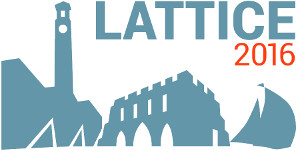Speaker
Dr
Alexander Rothkopf
(Institute for Theoretical Physics, Heidelberg University)
Description
The concept of a screening mass is a powerful tool to simplify the intricate physics of in-medium test charges surrounded by light charge carriers. While it has been successfully used to describe electromagnetic properties, its definition and computation in QCD is plagued by questions of gauge invariance and the presence of non-perturbative contributions from the magnetic sector.
Here we present a recent alternative definition [1] of a gauge invariant Debye mass parameter following closely the original idea of Debye and Hueckel. Our test charges are a static heavy quark-antiquark pair whose complex potential and its in-medium modification can be extracted using lattice QCD [2]. By combining in a generalized Gauss-Law the non-perturbative aspects of quark binding with a perturbative ansatz for the medium effects, we succeed to describe the lattice values of Re[V] and Im[V] [3] with a single temperature dependent parameter, in turn identified with a Debye mass.
We find that its behavior evaluated both in quenched QCD [4], as well as dynamical Nf=2+1 QCD [3] deviates from that in other approaches, such as hard-thermal-loop perturbation theory or from electric field correlators on the lattice. Around the phase transition e.g. its values tend to zero significantly faster than at weak-coupling.
[1] Y. Burnier, A.R. Phys.Lett. B753 (2016) 232-236
[2] A.R., T. Hatsuda, S. Sasaki, Phys.Rev.Lett. 108 (2012) 162001
[3] Y.Burnier, O. Kaczmarek, A.R. Phys.Rev.Lett. 114 (2015) 082001
[4] Y.Burnier, A.R. in preparation
[2] A.R., T. Hatsuda, S. Sasaki, Phys.Rev.Lett. 108 (2012) 162001
[3] Y.Burnier, O. Kaczmarek, A.R. Phys.Rev.Lett. 114 (2015) 082001
[4] Y.Burnier, A.R. in preparation
Authors
Dr
Alexander Rothkopf
(Institute for Theoretical Physics, Heidelberg University)
Dr
Yannis Burnier
(EPFL Lausanne)

